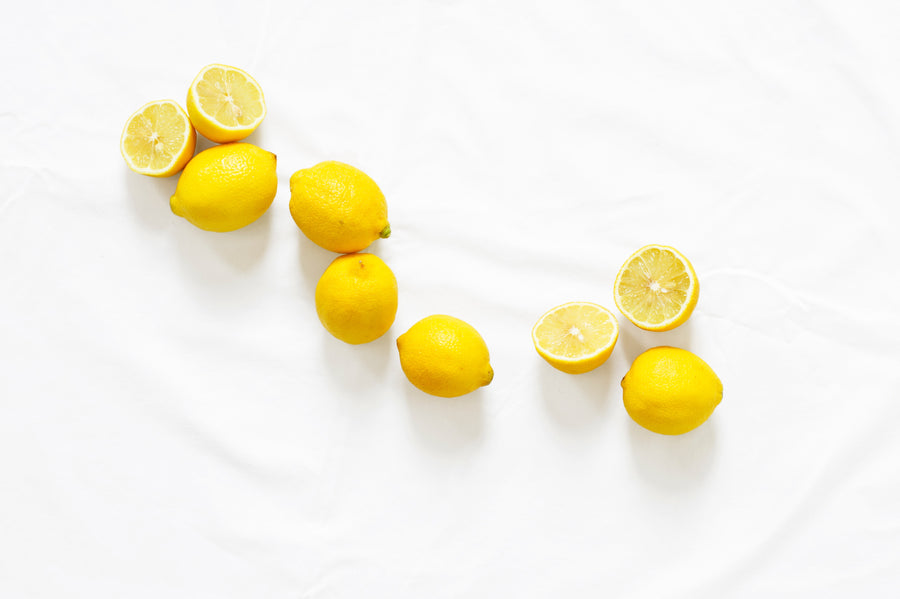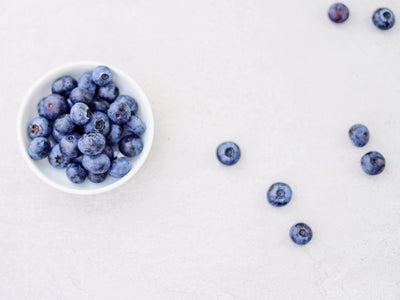6 Ways to Boost your Immunity

With thorough hand washing (deservedly) taking the top spot on the list of ways to contain the spread of a virus, it can feel like - aside from practising good hygiene - there’s not a great deal more we can do to keep ourselves safe from environmental contaminants.
But this would be to overlook the in-built, infection-battling bodyguard each and every one of us has at our disposal: our immune system. The test we face in our lifestyle choices is whether to neglect and abuse it, or to actively support and strengthen it.
Staying hydrated, prioritising sleep, exercising and eating healthily are the basic-but-important instruments in your immune support tool kit, but there are other, more specific, additional things you can do to give your immunity a very welcome boost:
Up your intake of Vitamin C
We won’t be winning any awards for originality with this one, but sometimes the oldest remedies really are the best.
Using vitamin C to strengthen immunity and lessen the potential impact of a virus is a tactic that’s firmly rooted in science. A “powerful antioxidant”,(1) vitamin C “contributes to immune defense by supporting various cellular functions of both the innate and adaptive immune system”.
By encouraging (2) the production of white blood cells – and protecting those white blood cells from free radical damage - vitamin C aids the body’s ability to effectively fight off infection.
Interestingly, further studies (3) have highlighted the “major role” of vitamin C as an “antioxidant defense” for the lungs, demonstrating that patients with pneumonia tend to have lower vitamin C levels.
Vitamin C supplements (look out for high dose varieties) are available at all good pharmacies, and can come in capsule, tablet and powder form. When taken as a tablet or powder however, vitamin C supplements often end up in the stomach - where they’re eliminated as waste. Liposomal supplements, on the other hand, use an encapsulation process to ensure the vitamin reaches the bloodstream – delivering it straight to the cells where it’s needed most.
Of course, lots of foods are fantastic natural sources of vitamin C, so it’s always a good idea to add more ingredients such as kiwis, kale, berries, broccoli, peppers and citrus fruits into your meals, smoothies and snacks.
For those wanting to try something different and take their vitamin boost to the next level, Intravenous (IV) vitamin drips could hit the spot. Long the pick-me-up of choice for celebrities burning the candle at both ends, a drip high in Vitamin C, B vitamins and glutathione is recommended for anyone feeling run down or wanting to supercharge their immunity.
Feed your microbiome
Every single one of us is a teeming mass of trillions of microbes. Collectively, they are known as our ‘microbiome’. Some of these microbes (also referred to as bacteria) live inside our bodies, some live on its surface – but most of them live inside our gut. In his book, ‘I contain Multitudes’, science journalist Ed Yong reveals that, remarkably: “there are more bacteria in your gut than there are stars in our galaxy.”
Our microbiome has a huge impact on our immune system, influencing the creation of whole classes of immune cells and suppressing disease-causing internal inflammation.
When we get stressed, eat unhealthy food, or take antibiotics, the microbes in our gut are thrown off-balance – meaning we not only have gut problems, but immune problems too. Additives, unhealthy fats and processed foods can all help to feed the inflammatory microbes or ‘bad bacteria’, thereby increasing our risk of inflammatory disease and wreaking havoc on our immune cells.
By contrast, when we eat foods high in fibre – pulses, beans, nuts, vegetables – an anti-inflammatory, immune-calming effect occurs and the gut is fortified and repopulated with healthy bacteria. Fermented foods – miso, kimchi, kombucha, yoghurt, sauerkraut, kefir - similarly help to up our levels of good gut bacteria. Taking a daily, high-quality probiotic can also be beneficial, and some people may find soil-based probiotics work well for them.
With their revolutionary range of products, air purification experts We Are Probiotic take this same science of balancing bad bacteria with good, and apply it to our indoor environments.
By repeatedly releasing an ultra-fine mist of millions of microscopic probiotics into the atmosphere, We Are Probiotic's patented air purifiers create an invisible yet powerfully protective layer of microflora – targeting germs and contaminants found in the air and on surfaces; reaching even the most difficult-to-clean areas of your home. Browse our curated selection of probiotic cleaning products here.
Trick your body into triggering an immune-boosting response with an infrared sauna
Here at Conscious Spaces, our fondness for infrared therapy and the healing benefits it brings knows no bounds, but there’s an intriguing school of thought which says regular infrared sauna sessions are in fact instrumental in improving immunity to infections.
The theory goes (4) that, by raising your core body temperature, an infrared sauna induces a sort of artificial fever. A fever is our body’s way of triggering a strengthened immune response – a kind of wake-up call for the immune system to kick into action and protect its precious property.
When combined with the other advantages that an infrared sauna offers – detoxification (high levels of environmental toxins create a body burden, leading to poor health), stress-relief (elevated cortisol levels are known to lead to a weakened immune system), improved circulation and the stimulation of energy at a cellular level (thereby upping white blood cell count) - this fever-like state is thought to boost the body’s resistance to disease.
Interestingly, some chemotherapy clinics (5) in Germany provoke hyperthermia in patients in order to make cancer cells more susceptible - thereby reducing the amount of medications needed. Albeit on a less extreme level, this same thing happens during a sauna session – bolstering the body’s ability to ward off illness by raising its core temperature.
Discover infrared therapy for yourself with our transformative range of SaunaSpace and Clearlight products here.
Get spicy
Not only handy for adding oomph to your cooking, lots of warming spices have well-documented anti-microbial and anti-viral properties - making them vital tools in your virus-fighting arsenal. Here’s three of our favourites:
GINGER
Fiery, zesty, sweet - ginger is powerful in both delicious flavour and disease-busting benefits. (6)
The active compounds and phytochemicals it contains are thought by scientists to boast significant anti-inflammatory and antioxidant effects – thereby boosting immune health and targeting ‘rhinoviruses’: the most common viral infectious agents and the chief cause of catching a cold.
Fascinatingly, one study (7) found that fresh ginger had antiviral effects against human respiratory syncytial virus (HRSV), which causes respiratory infections, and even lead to an enhanced immune response against HRSV.
HOW TO TAKE IT:
Ginger is best enjoyed in its fresh state, grated or diced into cooking (fresh ginger is particularly good in any Asian or middle eastern food – stir-fries, curries, tagines etc) or added to hot drinks. For a classic ginger tea, combine the juice of ½ a lemon, a 3cm piece of root ginger (finely sliced or grated) and 1 tablespoon raw honey with boiling filtered water. You can pick up fresh ginger root at all good supermarkets.
CLOVES
Not just for stuffing into Christmas hams or mugs of mulled wine, of all the spices in your store cupboard, scientists have discovered (8) that cloves may have the highest levels of antioxidant activity. Research shows that this quality isn’t diminished by heat either, with the antioxidant activity of cloves “retained even after boiling for 30min”.
HOW TO TAKE IT:
Whenever possible, buy whole cloves instead of ground since the latter loses its flavour quicker. You can add the cloves whole to cooking, or grind them yourself using a coffee bean grinder. Try poaching pears with cloves, cinnamon, wine and pure maple syrup, or use them in your favourite Sunday roast stuffing recipe.
TURMERIC
Inflammation is a root cause of many serious health conditions, with chronic inflammation often to blame for weakening our bodies’ immune response.
Curcumin, the active compound in turmeric, is thought to block our bodies’ inflammatory response pathway by inhibiting production of pro-inflammatory genes, (9) and has been extensively studied for its all-round disease-fighting potential. (10)
HOW TO TAKE IT:
Buy a good quality powdered turmeric, or opt for fresh turmeric root and grate it straight into your curries, soups, chai lattes and smoothies. For a side dish that steals the show, rub your vegetables (cauliflower and carrots are especially good) with ground turmeric, cumin seeds, olive oil, salt and black pepper before roasting. Turmeric is also available in supplement form, when it is often called 'curcumin' (look out for fermented turmeric supplement, or curcumin combined with black pepper - both of which can be very effective).
Introduce essential oils to your routine
Evidence from Ancient Egypt reveals (11) that scented plant oils were likely being used as far back as 4500 B.C – and aromatherapy is still a popular healing modality to this day.
At the heart of aromatherapy lies essential oils: natural oils that are extracted from plants and abundant in health-promoting properties.
Although there’s a vast array of essential oils out there, each with their own distinct qualities, a number of them are thought to support the immune system by alleviating stress and strengthening respiratory health. Tea Tree Oil and Frankincense are particularly prized for their immunity-enhancing benefits.
Pure essential oils can be potent, and need to be diluted before you use them. There’s a number of ways to do this – such as using a diffuser, or creating a water mist. Conscious Spaces Founder Tara Williams likes combining a carrier oil, like grapeseed oil or sweet almond oil, with a drop of frankincense, oregano and lavender oils for a simple, immune enhancing self-care ritual.
Reduce your exposure to electromagnetic frequencies
Whilst perhaps not an immediately obvious contributor to reduced immunity, exposure to electromagnetic fields (EMFs) has been found by a number of independent scientists to be harmful to health.
The existence of EMFs is not a new phenomenon (there are many natural sources of electromagnetic radiation). However, over the last century, exposure to man-made EMFs has been steadily increasing in line with the growing global demand for electricity and the more recent explosion of wireless technology and smart devices.
With papers numbering over 6,000, a cohesive body of evidence exists surrounding the damage caused to DNA, (12) cells, (13) organ systems, (14) fertility, (15) brain function,(16) liver (17) and memory (18) by EMFs.
With exposure to electromagnetic radiation proven capable of impacting human health at a cellular level, it follows that it could also adversely affect the immune system – potentially compromising its protective ability and leaving the body more vulnerable to disease.
To neutralise this negative effect, we recommend reducing your overall exposure to wireless technology and finding ways to mitigate the impact of the essential tech you can’t do without. For tips and advice on how to protect yourself and your family from electromagnetic radiation, have a browse of our informative collection of EMF articles here, or discover Qi-Technologies certified EMF protection devices here.
References
(1) https://www.mdpi.com/2072-6643/9/11/1211
(2) https://jlb.onlinelibrary.wiley.com/doi/full/10.1189/jlb.1TA0214-121RR
(3) https://pubmed.ncbi.nlm.nih.gov/15139458/
(4) https://www.clearlightsaunas.eu/all-health-benefits/
(5) https://goop.com/wellness/detox/the-power-of-infrared-saunas/
(6) https://www.ncbi.nlm.nih.gov/pmc/articles/PMC4106649/
(7) https://pubmed.ncbi.nlm.nih.gov/23123794/
(8) https://www.sciencedirect.com/science/article/abs/pii/S095232789990128X
(9) https://lpi.oregonstate.edu/mic/dietary-factors/phytochemicals/curcumin
(10) https://www.ncbi.nlm.nih.gov/pubmed/17999464
(11) http://essentialoilsacademy.com/history/
(12) https://www.ncbi.nlm.nih.gov/pubmed/28777669
(13) https://www.ncbi.nlm.nih.gov/pmc/articles/PMC5509895/
(14) https://www.cellphonetaskforce.org/wp-content/uploads/2018/06/Zory-Glasers-index.pdf
(15) https://www.ncbi.nlm.nih.gov/pubmed/27601711
(16) https://www.researchgate.net/publication/287406625_Electromagnetic_field_and_brain_development
(17) https://pdfs.semanticscholar.org/55c3/98d9788482e724017987f15eeeea72f5d24a.pdf
(18) https://www.ncbi.nlm.nih.gov/pmc/articles/PMC2666459/


































